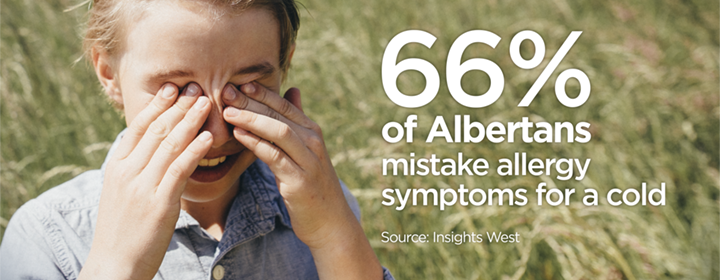Spring sniffles: Are you suffering from allergies or the common cold?

If you’re running a fever and feeling stuffed up, your first thought may be that you’ve caught a cold, but as we head into peak poplar tree pollen season, you’re likely suffering from spring allergies.
Aerobiology Research Laboratories monitors outdoor allergen levels across Canada. Throughout 2018, the company recorded 30 “very high” pollen days in Calgary and about 20 “very high” pollen days in Edmonton.
According to Aerobiology, last year’s tree pollen allergy season in Calgary lasted for 120 days, starting on March 28 and ending July 25. Edmonton had a much shorter season of 84 days which started later — on April 12 — and ended earlier — on July 12.
Two-thirds of Albertans mistake allergy symptoms for a cold, according to a recent survey done by InsightsWest on behalf of London Drugs.
Agusia McGrath is a pharmacist in Alberta and agrees that most Albertans mistake early season allergy symptoms with a cold.
“I ask, ‘Do you have fever? Has it lasted over two weeks?’ she said. “That guides [me] to be able to identify [the symptoms] as allergies rather than a cold.”
Symptoms: seasonal allergies vs. common cold
If you’re suffering from allergies, your eyes, ears and throat will feel itchy and you may notice wheezing when you breathe. However, a common cold will give you chills, a sore, scratchy throat and body pains.
There are similar symptoms for both — like a fever, runny, stuffy nose, sneezing and coughing. Those overlapping symptoms are why it’s difficult to tell between the two, but McGrath says the biggest difference is how long they linger.
“With cold symptoms, you’re going to have a fever, muscular aches and pains and usually the symptoms last about two weeks, whereas with allergy symptoms, your symptoms will last for weeks on end,” McGrath said.
Why do I have allergies?
Pollen from trees, grass or weeds is released into the air to fertilize other plants but sometimes they get into your nose and nasal passage.
If you’re allergic, your immune system kicks in, thinking the pollen is a hazard to your body. This is why your body sends out histamines into your blood — that’s when your nose starts running and your eyes get watery as your body tries to expel what it thinks is a danger.
“It’s a misfiring of your immune system by turning something innocuous into something it wants to fight off drastically,” allergist Dr. Susan Waserman said.
Symptoms can start as early as childhood, in teenage years or even as an adult.
If you’re not sure, simply get referred to an allergist for testing. You will be screened for common allergens, such as various types of pollens, cat and dog fur, dust mites, mould spores and more.
How can I ease allergy symptoms?
There are a handful of ways you can safeguard yourself to avoid a nasty few months of allergies, but pharmacists recommend you check with them before picking up any over-the-counter relief.
To benefit from the full effects of antihistamines, pharmacists recommend allergy sufferers start taking the medication two weeks before the start of the season.
Over-the-counter-meds: Antihistamines help to tame symptoms but make sure you’re seeking out options like Reactine, Aerius, or Allegra, according to Dr. David Fischer, who is an allergist.
Try to avoid Benadryl or other medications that come with side effects such as drowsiness.
Prescription medications: If needed, your doctor or allergist can prescribe eye drops, nasal sprays or other medicines to help alleviate symptoms.
Allergy shots: Those with severe allergies receive multiple injections — sometimes weekly — to tame their allergies.
Environmental factors: You can lessen your risk of encountering severe allergies by being mindful of your surroundings. For starters, don’t dry your clothes outside — that could bring in pollen that will trigger your symptoms.
Follow @tiffanyglobal
Sign up for our Health IQ newsletter
© 2019 Global News, a division of Corus Entertainment Inc.
Source: Read Full Article
